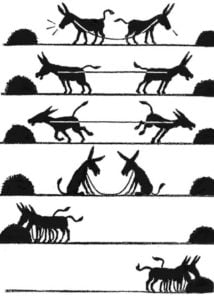In any intermediated transaction, the negotiator, initially mandated by one or the other of the parties, is generally considered - often wrongly - as being a priori committed to the cause of his principal.
Let us assume for a moment that the structural independence of the negotiator, excluding any link of subordination, and his or her essential interest in bringing the negotiation in which he or she intervenes to a successful conclusion, could make him or her a third party, if not absolutely neutral, at least likely to optimize an agreement for both parties.

Why use an intermediary to negotiate a transaction?
When we take charge of the sale of a vineyard and we have first presented to the seller the buyer whose project best corresponds to the conditions in presence, we can then undertake the negotiation of the terms and conditions of the sale.
This is where the intermediation mission really begins. It consists in transforming a power relationship, with subjective and antagonistic seller / buyer positions, into a positive and constructive relationship whose purpose is to obtain an agreement in the best interests of everyone.
And one of the fundamental prerequisites to this intermediation mission is the establishment of a relationship of mutual and lasting trust between the negotiator and each of the two parties.
No trust, No business !
Why capitalize on the expertise of the negotiator-mediator?
For the selling owner, owning a wine estate has usually involved a significant personal commitment. Whether it is a family estate with a transgenerational history, a more recently acquired vineyard or an industrial-scale operation, all convey a strong emotional dimension inherent to the wine activity itself, to its hazards and to the attachment to the land. Most of the time, these conditions feed a strong and legitimate subjectivity.
On the buyer's side, his approach is often more phlegmatic. On the other hand, his advisors often tend to want to secure their client's positions at the highest level by transferring the maximum risk to the other party. This is at the same time the very reason for their intervention. And they are not supposed to manage the impact that this may have on the relationship between the parties.
We are thus in the presence of protagonists who are supposed to reach an agreement in the long run, while each considers that his or her point of view is legitimate and that the disputes arising from the very antagonism of their positions are exclusively attributable to the other.
However, the transaction in its finality rests well on the essential principle of compromise. It therefore inevitably presupposes a rapprochement and a mutual understanding.
In these conditions, the intervention of the negotiator-mediator is fundamental.
Through his intermediation, he will at the same time reinforce the rational foundations of the positions of each party, prevent situations likely to generate tensions, and as a good connoisseur of the sensitivities of each party, he will bring the parties closer together so that the final agreement will be of the highest possible value for all; that is to say: that everyone receives the best benefits.
In this the negotiator-mediator creates added value in the transaction.
What is its modus operandi?
The intermediary's action must compensate for the disparities that remain between the parties, which may be related to their cultural origins, their social or professional backgrounds, or their personal styles, in addition to the divergence of their interests.
After having independently identified the interests of each party, he is in a position to guide the negotiations in order to privilege the satisfaction of these interests and optimize the value of the agreement.
He must be able to maintain individual relations with each party and his counsel without the opposing party necessarily having to know about it; his position being decorrelated from any subjectivity.
In his role of conflict prevention, he is often called upon to act as a buffer between the hammer and the anvil! And this is always done with the utmost discretion and with the necessary distance; a posture that is not incumbent on the parties who by definition remain exposed.
His position in these circumstances is rather delicate because he takes on charges that are not really his responsibility, while at the same time having to maintain the trust of his interlocutors.
Hence the importance of the degree of trust that must govern their relationship.
What is its added value compared to that of the parties' counsel?
In the course of the negotiations, sellers and buyers call upon advisors (lawyers, tax specialists, notaries, etc.) to defend their individual interests. These advisors are therefore in principle exclusively committed to their client's cause.
This is why, without a third party mediator, the negotiation is more likely to tend towards a distancing of the positions of the parties, or even an arquebolization of each, than towards a rapprochement of the latter. This is however essential for the success of the project.
We regularly see well-initiated negotiations between protagonists willing to agree on a transaction degenerate into conflictual relations and finally fail because of the preponderance of individual interests.
It is to avoid this risk of counter-performance that the intervention of the third-party mediator from the beginning of the relationship between the parties is necessary. And if we stick to his essential function, which is to prevent conflicts before they arise - which presupposes an established relationship of trust - it would be illusory to imagine that he could only be called upon when tensions arise. In a high-risk fire area, before calling the fire department to put out the fire, a risk prevention plan must be put in place!
Before the negotiations, the owner-seller and the negotiator having established this relationship of trust, the latter will be informed of the possible apparent or not risks that the operation carries and will be able to prevent their untimely occurrence in the middle of the negotiations.
During the negotiation, bad surprises discovered by the buyer are excessively prejudicial and counterproductive for the agreement. This systematically induces a loss of confidence, a rise in suspicion, which can lead at best to a revision of the price or the conditions and at worst to a disinterest and a withdrawal of the buyer. In other words, in the best of cases, this situation leads to a sub-optimal agreement.

This is why, when the seller and the buyer have freely accepted the conditions of principle of a transaction together, the role of the negotiator-mediator is to conduct a negotiation at the highest level of added value for both parties and not to defend the interests of one of them against those of the other.
As opposed to a rearguard action which presupposes that in order to win a game the opponent must lose it, we inscribe our action in a resolutely win-win process, convincing both in terms of success of the projects and optimization of the individual objectives.

Arnaud COURRET – BLUE SIDE - Vineyard Properties – 11/2018






